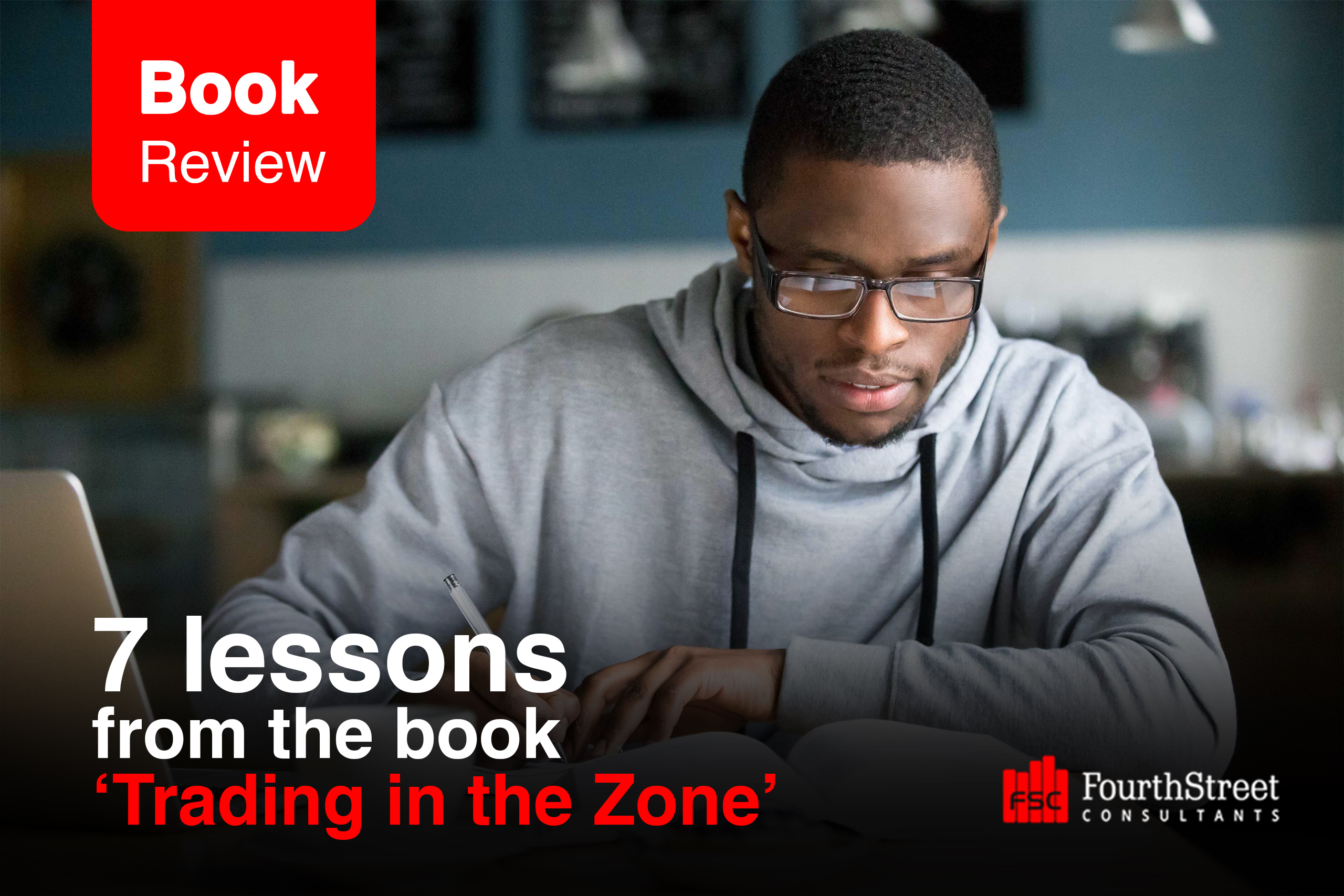Few things intrigue me in this life more than the understanding of human psychology. This was my third time reading Mark Douglas’s book, ‘Trading in the zone’ and I must admit, I have acquired a few more revelations that hadn’t hit me in my previous two reads, and yet, the content of the book remains the same. Interesting right? The lesson herein is that whereas the contents of the book remain unchanged, my mind has been more receptive to consuming the book for the third time, and probably my attitude towards some elements of trading, than four years ago when I read it for the first time. The mind is such a powerful tool when applied in the right space & attitude, which is exactly what this book is all about, and precisely why it remains to be one of my top three trading books.
Let’s indulge. Shall we?
1. Resolution to Survive
Ever wondered why so many successful & learned people don’t excel in trading as they do in their areas of expertise? This is mostly because they can’t influence the market to get results, as they can manipulate social circles & employ their networks to achieve results.
Douglas denotes that as human beings, we are wired to avoid any physical or emotional pain. This is why people pay hefty fees to lawyers to avoid jail time or consequences thereof even when they’re guilty. It’s an innate trait for human beings to try all we can to avoid pain or loss. This is not the case in trading. You can’t ever avoid losses in trading, they’re part of the business. The exact reason why most don’t make it in this business.
Taking conscious control of your emotions both when experiencing losing and Winning trades is the ultimate ‘holy grail’ to consistent results from trading. This is the toughest part of trading. Attaining this high-level state of mind calls for self-mastery so that you follow the market without implicating your own ideas or expectations and outcomes. It means your job as a trader is not to prevent losses, but instead, accept losses as part of the winning, and carry this attitude throughout your trading activities.
2. Accountability & Rule-based Trading system
Once you choose to receive tips or trading directions from some broker or news channel, it becomes easy to blame them as the cause of your failure, hence not taking accountability for your actions. You convince your mind that it was not your fault, which is counterintuitive & retrogressive in achieving consistency in making money from the markets.
Failure to set up rules & strictly adhere to them devoid of your personal emotions is the main reason why most traders don’t achieve consistency in the markets.
The financial market offers a gift and a curse at the same time. A gift in that it gives you all the freedom to risk and hence make money however & wherever you want. It further lures traders by offering more power to execute bigger positions than their capital levels by using leverage offered freely by brokers.
Unfortunately, this is the very source of the curse that comes with trading. The fact that there isn’t any external body watching over your actions, or a set of rules governing your trading, is the very obscenity that keeps most people from living off trading. It’s a fact that human beings are not capable of governing themselves or coexisting by their own without a set of rules and relevant bodies to oversee their actions. This is why we have laws in governments, schools, workplaces, clubs, & in all spheres of our lives.
3. Winning Attitude/Mental Analysis
Many traders with high-level analytical trading skills aren’t making money because they’re easily distracted by other traders or news. They end up not trading the opportunities they clearly marked out from the forex markets but instead believe in another random trader from Australia, or the latest update from the Bloomberg news channel, only for their own analysis to turn out as big winners. According to Mark Douglas, successful & consistent traders are individuals with a positive attitude towards the markets, & life in general, and those that develop a high level of mental strength, which is the hardest part of successful trading. Not many people have the mental fortitude to withstand losses happening right in front of their eyes, and not react to it, but let it all play as per the trading plan on the table. We covered the topic of how to handle losses in trading in a previous blog article. This is your chance to ‘beat the market.’
4. Trader Expectations
The markets do not owe you anything. This is probably the most absolute, yet harsh statement. In life, and in business, people work with expectations. It’s actually almost impossible to not have expectations, to not blame people if they don’t return the favor, or do their part of their bargain. Most traders step into the pitch with crazy expectations, mostly based on what they have read or heard from the internet or fraudulent ‘trading experts/gurus’, not to mention the alluring marketing pitches from forex brokers hungry for their capital. Wrong/unrealistic expectations from the markets is the reason why most beginners don’t last more than 6 months in the game, and end up Losing and labeling forex trading as a ‘scam.’ Totally ridiculous. A market with a daily total liquidity of over 6 trillion dollars. With banks and international hedge funds participating and managing billions of dollars worth of portfolios for their clients. Take for instance, Bridgewater Associates & Renaissance Technologies, two of the largest hedge funds in the world, with a combined AUM of over $200 Billion, just to mention a few.
5. Lack of Training & Proper Mentorship
The most absurd perception of new traders is how easy they think it is to make money in the forex markets. Let’s take a second, or two, to ponder. Lawyers take up to 8 years to represent clients in court. Economics & actuaries spend 4 years in college. Engineers endure at least 6 years to even get a junior position in a renowned firm, yet new traders think they could make a fortune, or double their small capital in a week, or a month, after watching a couple of trading videos on YouTube. Absurd right?? I must admit even I fell for this in my first days in trading. All I can say is it was TOO COSTLY! It’s even harder to make money in trading without proper training and continuous mentorship, especially in your first months of trading. You’re prone to make mistakes and have no one to correct you and hand-hold you through your trading career. Be true to yourself, you want to make some extra income consistently, there is a price to pay, both for your time and money. Trading the forex & stocks market is no get-rich-quick business whatsoever.
Mark Douglas notes that whatever the outcome you get from trading, you can’t blame the market for your results. The true understanding that your trading results solely reflect your own actions is the first step towards a successful career in trading.
6. Trade For-Profits, Not for the Thrill
The most successful traders in the world, those that achieved consistent success for years are those that have cultivated a mental space that accommodates losing the same way as winning trades. This way, they stick to their rules & trading plan, despite the outcomes. This group of traders derive their gratification in following and trusting their own trading systems, because they have tested the rules therein, and understand the underlying dynamics of the markets. The goal is to confidently take small losses, and ride big winners, the ultimate secret of successful trading. This is how a trader makes a resolution to survive in the game, and to approach trading as a business, as opposed to a source of excitement & chemical rush that comes with breaking the rules and risking big!
7. The Traders Perspective
Predefining your risks, cutting losses when trades are not working, & systematically taking profits. These are the three rules of the game.
It is one thing to do clear-cut analysis on the charts, to a level of even betting your life on it. However, there are more variables that affect the market movements that we shall never know. For instance, would you know how many traders are sitting on the sidelines waiting to buy, or sell, or would you know how many traders are thinking of exiting their trades, or adding up their positions? Professional traders know they can’t ever fully predict the markets. As such, they always cover their losses and have their total risk exposure predefined before initiating any position in the markets.
Typical retail traders are prone to ignore this mere fact, some due to greed, others due to ego, and a sizable number of them due to a lack of knowledge & true understanding of how the markets function.
In conclusion, trading in the zone, according to Mark Douglas, means that your mind and the market are in sync. The zone is a space where you’re in complete harmony with the forex markets. You take what the markets gives you, and accept whichever outcome. Period. I must admit, there are so many more lessons and golden nuggets of wisdom from this book than I could cover in this article. This is definitely a must-read for all traders out there.



